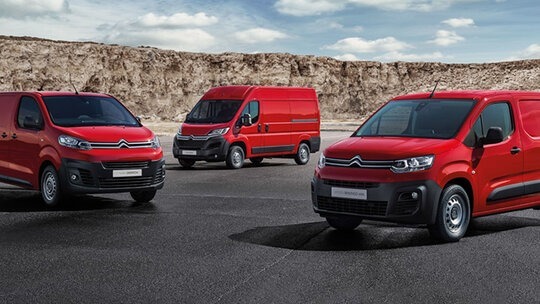What Tax Benefits Are There When Owning a Commercial Vehicle
You may want to purchase a commercial vehicle (CV) to help with your business tasks, transport your tools and so much more, but did you know that there are some tax benefits linked to your purchase? We have written this article to demystify a topic worth considering when purchasing your next CV and we hope it will be helpful to you.
Can I Claim VAT on my CV?
If your business is VAT registered, you will be able to reclaim 100% of the VAT for any commercial vehicle you purchase or lease; this may be a considerable amount depending on the vehicle you choose.
What Are My Tax Benefits?
As a commercial vehicle owner you may be entitled to the super-deduction tax or the benefit-in-kind, but let’s explore more in detail what they require and whether you are eligible.
Super Deduction Tax
The first option you have is the “super deduction tax” which offers 130% first-year tax relief on qualifying main-rate plant and machinery investments. It applies to expenditures incurred between the 1st of April 2021 and the 1st of April 2023. Under the “super deduction tax” for every £1 a company invests, their taxes can be cut up to 25p. The following vehicles count as plant and machinery:
- Tractors, lorries, vans, pickup trucks
- Electric vehicle charge points
This means that not only you can choose a Petrol or Diesel vehicle, but you will also be able to claim an EV charge point should you choose an electric CV for your business.
More info can be found at the following link.

Benefit In Kind
Another option you have is the “benefit in kind” (BIK), which applies to commercial cars purchased as a sole trader or by an employer.
A commercial car is considered a benefit by the Government (as for instance, if purchased by an employer, it’s seen as a financial perk which isn’t part of your salary), hence why it’s subject to taxes under the Benefit in Kind. So it’s important to do your research before choosing a company car as purchasing the wrong one could translate into an expensive mistake since the tax contributions come out from your payslip.
Your commercial car’s tax contributions are calculated by taking into account the vehicle’s CO2 emissions, how much you earn and the cost of the car (excluding road tax and first-year registration fee). However, it’s important to note that choosing an electric car will definitely play in your favour as the BIK on company EVs is only 2% until April 2024 regardless of your income or the vehicle’s cost, with PHEVs getting favourable rates as well.
On the flip side, Diesel vehicles get penalised because of their emissions, paying an additional 4% tax surcharge compared to their Petrol counterparts.
In order to calculate your company car’s tax, HMRC will take the value of your car (including list price, delivery price and VAT) and multiply it by the BIK rate (which is based on the vehicle’s CO2 emissions to encourage motorists to choose greener cars) and then multiply that figure by your income tax rate (20, 40 or 45%).

Benefit in Kind bands are subject to a yearly increase, however, HMRC has confirmed that they will remain fixed until April 2024.
Below is a table to help you understand more about the BIK rate percentage for vehicles registered after April 2020 based on their emissions.
|
CO2 Emissions (g/km) |
Electric Range (miles) |
Petrol, Electric RD2 (Real Driving Emissions) Diesel ** |
|
0 |
|
2% |
|
1-50 |
130+ |
2% |
|
1-50 |
70-129 |
5% |
|
1-50 |
40-69 |
8% |
|
1-50 |
30-39 |
12% |
|
1-50 |
|
14% |
|
51-54 |
|
15% |
|
55-59 |
|
16% |
|
60-64 |
|
17% |
|
65-69 |
|
18% |
|
70-74 |
|
19% |
|
75-79 |
|
20% |
|
80-84 |
|
21% |
|
85-89 |
|
22% |
|
90-94 |
|
23% |
|
95-99 |
|
24% |
|
100-104 |
|
25% |
|
105-109 |
|
26% |
|
110-114 |
|
27% |
|
115-119 |
|
28% |
|
120-124 |
|
29% |
|
125-129 |
|
30% |
|
130-134 |
|
31% |
To give you an example, let’s take a BMW Series 3 Petrol from 2021. Its value is £33,599 and its emissions are 132 g/km, falling into the 31% BIK band. Based on the calculations explained above, the annual benefit value for this vehicle (value of the car * BIK rate result) is £10,080, which you will then need to multiply by 20,40 or 45 depending on your income tax rate.
For more information on the BIK bands, click here.
To calculate the tax rate for your company vehicle click here for the HMRC calculator.
We hope our article has helped you understand what your taxing benefits are when it comes to commercial vehicles, however, should you have any further questions, please contact your nearest Perrys and our team will be happy to help you.
Tags: *CV *Commercial *Vehicle *Commercial_Vehicle *Tax_Benefits *Cv_Tax_Benefits


